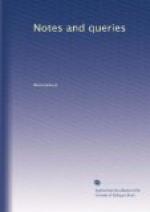“See what mishaps dare e’en
invade Whitehall,
This silly fellow’s death puts off
the ball,
And disappoints the Queen’s foot,
little Chuck;
I warrant ’twould have danced it
like a duck.”
CH.
Kant’s Saemmtliche Werke.—Under the head of “Books and Odd Volumes” (Vol. ii., p. 59.), there is a Query respecting the XIth part of Kant’s Saemmtliche Werke, to which I beg to reply that it was published at Leipzig, in two portions, in 1842. It consists of Kant’s Letters, Posthumous Fragments, and Biography. The work was completed by a 12th vol., containing a history of the Kantian Philosophy, by Carl Rosenkranz, one of the editors of this edition of Kant.
J.M.
Becket’s Mother (Vol. i., pp. 415. 490.; vol. ii., p. 78.).—Although the absence of any contemporaneous relation of this lady’s romantic history may raise a reasonable doubt of its authenticity, it seems to derive indirect confirmation from the fact, that the hospital founded by Becket’s sister shortly after his death, on the spot where he was born, part of which is now the Mercers’ chapel in Cheapside, was called “The Hospital of St. Thomas the Martyr of Acon.” Erasmus, also, in his Pilgrimages to Walsingham and Canterbury (see J.G. Nichol’s excellent translation and notes, pp. 47. 120.), says that the archbishop was called “Thomas Acrensis.”
Edward Foss.
"Imprest” and “Debenture."—Perhaps the following may be of some use to D.V.S. (Vol. ii., p. 40.) in his search for the verbal raw material out of which these words were manufactured.
Their origin may, I think, be found in the Latin terms used in the ancient accounts of persons {107} officially employed by the crown to express transactions somewhat similar to those for which they appear to be now used. Persons conversant with those records must frequently have met with cases where money advanced, paid on account, or as earnest, was described as “de prestito” or “in prestitis.” Ducange gives “praestare” and its derivatives as meaning “mutuo dare” with but little variation; but I think that too limited a sense. The practice of describing a document itself by the use of the material or operative parts expressing or defining the transaction for which it was employed, is very common. In legal and documentary proceedings, it is indeed the only one that is followed. Let D.V.S. run over and compare any of the well-known descriptions of writs, as habeas corpus, mandamus, fi. fa.: or look into Cowell’s Interpreter, or a law dictionary, and he will see numerous cases where terms now known as the names of certain documents are merely the operative parts of Latin formulae. “Imprest” seems to be a slightly corrupted translation of “in prestito;” that part of the instrument being thus made to give its name to the whole. Of “debenture” I think there is little doubt that it may be similarly explained.




